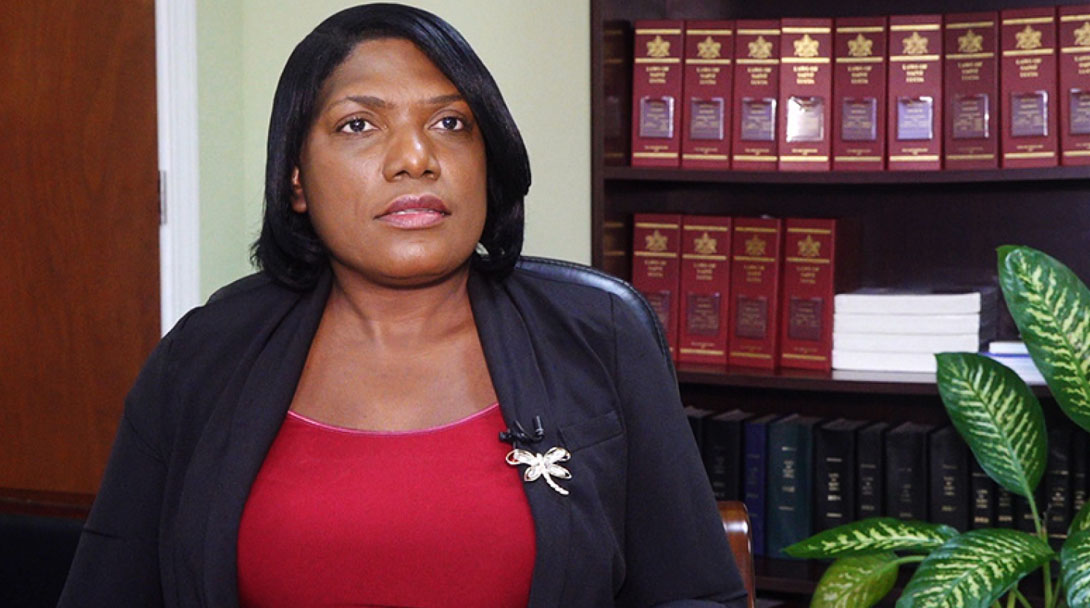PERMANENT Secretary in the Department of Finance, Esther Rigobert has indicated that COVID-19 had erased economic gains Saint Lucia had made over the years.
She made these remarks at a press conference this week held to update the country on a recent meeting between Saint Lucia, the IMF and the World Bank.

“Prior to COVID-19, Saint Lucia had made significant progress with its economic growth indicators and well on the path to realizing spillover gains. Notwithstanding, the COVID-19 pandemic has erased the gains of the prior years at all levels,” Rigobert said.
“The COVID-19 pandemic has had a debilitating impact on our economy. However, the Government has embarked upon a wide array of policy interventions to help mitigate the effect of the crisis, and to bring relief to the most vulnerable groups, particularly those who lost their source of income. We all would agree that the crisis is two-fold: a healthcare crisis and an economic crisis. As such, relief needs to cater to the health, social and economic needs of our citizens,” she said.
The Permanent Secretary intoned that the COVID-19 pandemic had caused untold damage to countries across the globe. Particularly vulnerable were Small Island Developing States.
“On account of the economic shocks of COVID-19 pandemic, assistance from the international community is required in order to prevent a domino effect of protracted debt issues morphing into a financial crisis as we saw in 2008/2009.
“Should this occur, it would undermine economic stability in the region and could lead to a collapse of the social safety net systems, and further erode our gains in poverty alleviation. Such a collapse and the ensuing ramifications will linger long after the pandemic, and essentially stymie the ability of the region to meet existing debt sustainability thresholds. This outturn however need not be the case,” she noted.
According to Rigobert emanating from the stakeholder consultations, a three-phased approach was used to help manage the crisis. The first phase saw the development of the COVID-19 Health Response Plan. The second phase resulted in the development of the Social Stabilization Programme; and the third phase saw the development of the Economic Recovery & Resilience Plan (ERRP). All of which cater to different, but equally important priorities for the Government and people of Saint Lucia and their roll out have proven to be of benefit to a wide cross-section of the population and hopefully will impact the country as a whole.
She said the IMF/WB annual meetings held this month dealt with a wide range of topics, whilst focusing on the economic impact of COVID-19 and the ensuing short to medium term fiscal and debt related issues.
“Small Island Developing States, for decades, have had to deal with the reality of economic shocks and interruptions to their efforts geared at economic growth and development, due in a large measure to climate change, natural disasters, lack of liquidity and high debt levels. In just a few hours, a hurricane or storm surge could wipe away years of development gains, and hamper future economic growth and expansion,” Rigobert said, adding that due to these vulnerabilities, Caribbean countries are now in need of concessional financing and assistance that does not depend on maintaining or achieving the targeted Debt to GDP ratio of 60%, but which considers the impacts of economic shocks on these economies.
“To attain the desired level of transformation needed to drastically catapult our economies to the next level, it is important that small States be rewarded for pursuing sound development policy, while also giving due consideration to the inherent vulnerability to climate change that characterizes Caribbean States. It is clear that while climate change is impacting countries at varying degrees, it is an existential threat to the lives and livelihood of many of our citizens. It is on that basis that special considerations should be given to Small Island Developing States within the Development Finance framework,” she said.
According to her, given the importance of international finance and banking services to economic growth and development, there needs to be a review of the existing requirements for correspondent banking relationships. Global leaders need to take a proactive approach in addressing the impact of reduced access to international banking and financial services and markets caused by de-risking.
Rigobert noted that the annual meetings presented an opportunity for regional leaders to engage in productive dialogue with world leaders, particularly the IMF and World Bank, on the issues being faced by Caribbean countries.
“Our countries need to be viewed as partners, as we are not expecting to be the beneficiaries of opportunities which we are not entitled to. As such, we made a strong appeal to the International Financial Institutions to facilitate engagement at the highest levels as we all try to mitigate the current crisis,” she said.
She added, “In light of the current situation, we made a case for our region, particularly as it relates to debt sustainability, resilience building, fiscal stability, creating buffers for climate change and natural disasters and protecting economic growth.”










![.[L-R] Parliamentary Representative for Castries Southeast, Lisa Jawahir & Talk show host, Timothy Poleon](https://thevoiceslu.com/wp-content/uploads/2026/02/Lisa-Jawahir-Timothy-Poleon-380x250.jpg)
![Public Service and Utilities Minister Stephenson King delivered remarks [Photo credit: VP]](https://thevoiceslu.com/wp-content/uploads/2026/02/Stephenson-King-380x250.jpg)

